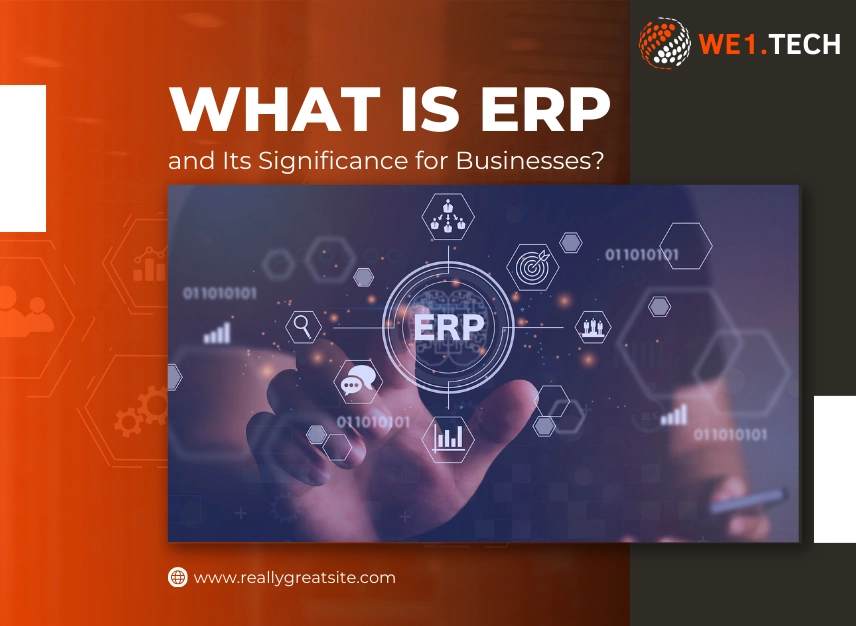
In today's tech-driven world, businesses are increasingly turning to software solutions to streamline their operations and stay competitive. As organizations grow, it becomes difficult to manage day-to-day tasks manually using spreadsheets. That's where the role of the ERP software system comes in. ERP is a popular term among business professionals. However, a lot of enterprises still don't know what exactly an enterprise resource planning system can do for their teams. It serves as a centralized platform, efficiently managing several business processes, from finance and human resources to inventory and supply chain.
This blog post explores the significance of ERP for businesses, shedding light on its benefits and features. So, let's get started!
All You Need to Know About the Enterprise Resource Planning (ERP) System
Enterprise Resource Planning (ERP) is a software solution that integrates and streamlines several business processes within an organization. It serves as a centralized platform where data from different departments, such as accounts, customer relations, human resources, manufacturing, and the supply chain, is consolidated and synchronized. It works by collecting, managing, and storing data from different departments, ensuring that information is accessible across the organization. Thus, the core concept of this innovative technology is to offer a real-time and unified view of business operations. This seamless integration enables enhanced collaboration, efficient workflow, and informed decision-making. The importance of an ERP system for businesses cannot be overstated, as it not only enhances operational efficiency but also helps organizations stay agile in today's competitive marketplace. With features such as automation, customizable modules, and data analytics, ERP software brings a bundle of benefits, including cost reduction, increased customer satisfaction, improved productivity, and profitability. In the most inclusive sense, ERP acts as an instrumental tool that empowers businesses to navigate complexities and achieve sustained growth.
Essential Features of an Enterprise Resource Planning System
ERP software comes with a full suite of features and functions that enable businesses to automate day-to-day tasks and achieve sustainable success. Businesses can access all of these features or only the ones that they require.
Let's explore the most essential ERP features:
Automation Capabilities
One of the most amazing features of ERP software is its automation capabilities. This allows organizations to streamline repetitive tasks and processes, reducing manual effort and minimizing the risk of errors. From data entry to workflow management, automation enhances efficiency, enabling employees to focus on more strategic and value-added activities.
Accounting and Finance
The accounting and finance features give organizations the tools to manage financial transactions, track expenses, handle payroll, and generate accurate financial reports. With real-time reports, decision-makers gain instant insights into the financial health of the company, enabling them to make well-informed decisions and ensure compliance with accounting standards and regulations.
Analytics and Reporting
ERP systems come equipped with powerful analytics and reporting tools that turn raw data into actionable insights. These tools enable users to create customized reports, analyze trends, and gain a deeper understanding of business performance. By providing real-time insights and reports, ERP software empowers organizations to make data-driven decisions, identify opportunities for improvement, and respond quickly to market changes.
Customer Relationship Management (CRM)
CRM is one of the most popular modules that help businesses build and nurture strong relationships with their customers. This includes managing customer interactions, tracking sales leads, and providing a comprehensive view of customer data. This feature enhances customer satisfaction, streamlines sales processes, and supports targeted marketing efforts.
Human Resources Management (HRM)
ERP software includes modules dedicated to Human Resources Management (HRM), covering various HR functions such as employee onboarding, payroll processing, performance management, and talent acquisition. These features ensure that HR processes are efficient, transparent, and compliant with regulations, contributing to an optimized and well-managed workforce.
Project Management
The project management modules facilitate proper planning, scheduling, and tracking of projects. It enables teams to work collaboratively, allocate resources effectively, and monitor project progress in real-time. With features like task assignment, milestone tracking, and resource allocation, project management within ERP ensures streamlined workflows and successful project execution.
Inventory Management
Inventory-focused features help businesses maintain optimal stock levels, reduce carrying costs, and increase overall supply chain efficiency. Inventory-related modules within ERP provide real-time visibility into stock levels, streamline reorder processes, and enable accurate tracking of goods, ensuring businesses can meet customer demands while minimizing holding costs.
Manufacturing and Procurement
ERP solutions excel in managing manufacturing processes and procurement activities. It supports planning and scheduling of production, monitors manufacturing workflows, and ensures efficient resource allocation. Additionally, it streamlines procurement by automating purchase orders, vendor management, and procurement workflows, leading to cost savings and improved production timelines.
Supply Chain Management (SCM)
The SCM module optimizes the entire supply chain process. It integrates several functions like production, warehousing, distribution, logistics, and demand planning. This comprehensive approach enhances visibility, minimizes delays, and enables proactive decision-making. ERP's SCM functionality ensures a synchronized and responsive supply chain, crucial for meeting customer demands and maintaining competitiveness.
Order Management
ERP software streamlines order processing from initiation to fulfillment. The order management module automates order entry, tracks order status in real-time, and facilitates clear communication between sales, inventory, and production teams. This ensures accuracy in order fulfillment, reduces lead times, and enhances customer satisfaction.
Warehouse Management
This software suite includes advanced warehouse management modules that optimize storage, tracking, and movement of goods within the warehouse. By automating tasks like order picking, packing, and shipping, ERP enhances warehouse efficiency, minimizes errors, and improves overall inventory accuracy. Real-time data ensures timely decision-making, reducing bottlenecks and enhancing the overall supply chain process.